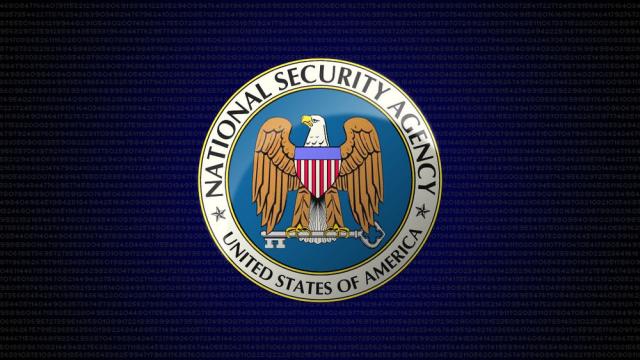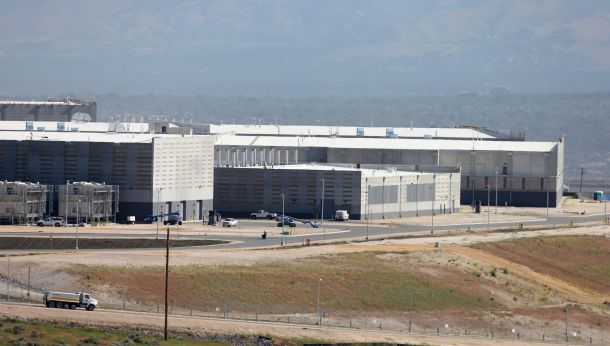
The National Security Agency has acknowledged in a new classified briefing that it does not need court authorization to listen to domestic phone calls, a participant said.
Rep. Jerrold Nadler, a New York Democrat, disclosed on Thursday that during a secret briefing to members of Congress, he was told that the contents of a phone call could be accessed "simply based on an analyst deciding that."
If the NSA wants "to listen to the phone," an analyst's decision is sufficient, without any other legal authorization required, Nadler said he learned. "I was rather startled," said Nadler, an attorney and congressman who serves on the House Judiciary committee.
Not only does this disclosure shed more light on how the NSA's formidable eavesdropping apparatus works domestically, it also suggests the Justice Department has secretly interpreted federal surveillance law to permit thousands of low-ranking analysts to eavesdrop on phone calls.
James Owens, a spokesman for Nadler, provided a statement on Sunday morning, a day after this article was published, saying: "I am pleased that the administration has reiterated that, as I have always believed, the NSA cannot listen to the content of Americans' phone calls without a specific warrant." Owens said he couldn't comment on what assurances from the Obama administration Nadler was referring to, and said Nadler was unavailable for an interview. (CNET had contacted Nadler for comment on Friday.)
Because the same legal standards that apply to phone calls also apply to e-mail messages, text messages, and instant messages, being able to listen to phone calls would mean the NSA analysts could also access the contents of Internet communications without going before a court and seeking approval.
Nadler's initial statement appears to confirm some of the allegations made by Edward Snowden, a former NSA infrastructure analyst who leaked classified documents to the Guardian. Snowden said in a video interview that, while not all NSA analysts had this ability, he could from Hawaii "wiretap anyone from you or your accountant to a federal judge to even the president."
There are serious "constitutional problems" with this approach, said Kurt Opsahl, a senior staff attorney at the Electronic Frontier Foundation who has litigated warrantless wiretapping cases. "It epitomizes the problem of secret laws."
The NSA declined to comment to CNET. (This is unrelated to the disclosure that the NSA is currently collecting records of the metadata of all domestic Verizon calls, but not the actual contents of the conversations.)
Rep. Mike Rogers (R-Mich.), the head of the House Intelligence committee, told CNN on Sunday that the NSA "is not listening to Americans' phone calls" or monitoring their e-mails, and any statements to the contrary are "misinformation." It would be "illegal" for the NSA to do that, Rogers said.
The Washington Post disclosed Saturday that the existence of a top-secret NSA program called NUCLEON, which "intercepts telephone calls and routes the spoken words" to a database. Top intelligence officials in the Obama administration, the Post said, "have resolutely refused to offer an estimate of the number of Americans whose calls or e-mails have thus made their way into content databases such as NUCLEON."
Earlier reports have indicated that the NSA has the ability to record nearly all domestic and international phone calls — in case an analyst needed to access the recordings in the future. A Wired magazine article last year disclosed that the NSA has established "listening posts" that allow the agency to collect and sift through billions of phone calls through a massive new data center in Utah, "whether they originate within the country or overseas." That includes not just metadata, but also the contents of the communications.
William Binney, a former NSA technical director who helped to modernize the agency's worldwide eavesdropping network, told the Daily Caller this week that the NSA records the phone calls of 500,000 to 1 million people who are on its so-called target list, and perhaps even more. "They look through these phone numbers and they target those and that's what they record," Binney said.
Brewster Kahle, a computer engineer who founded the Internet Archive, has vast experience storing large amounts of data. He created a spreadsheet this week estimating that the cost to store all domestic phone calls a year in cloud storage for data-mining purposes would be about $27 million per year, not counting the cost of extra security for a top-secret program and security clearances for the people involved.
NSA's annual budget is classified but is estimated to be around $10 billion.
Documents that came to light in an EFF lawsuit provide some insight into how the spy agency vacuums up data from telecommunications companies. Mark Klein, who worked as an AT&T technician for over 22 years, disclosed in 2006 (PDF) that he witnessed domestic voice and Internet traffic being surreptitiously "diverted" through a "splitter cabinet" to secure room 641A in one of the company's San Francisco facilities. The room was accessible only to NSA-cleared technicians.
AT&T and other telecommunications companies that allow the NSA to tap into their fiber links receive absolute immunity from civil liability or criminal prosecution, thanks to a law that Congress enacted in 2008 and renewed in 2012. It's a series of amendments to the Foreign Intelligence Surveillance Act, also known as the FISA Amendments Act.
That law says surveillance may be authorized by the attorney general and director of national intelligence without prior approval by the secret Foreign Intelligence Surveillance Court, as long as minimization requirements and general procedures blessed by the court are followed.
A requirement of the 2008 law is that the NSA "may not intentionally target any person known at the time of acquisition to be located in the United States." A possible interpretation of that language, some legal experts said, is that the agency may vacuum up everything it can domestically — on the theory that indiscriminate data acquisition was not intended to "target" a specific American citizen.
Rep. Nadler's statement that NSA analysts can listen to calls without court orders came during a House Judiciary hearing on June 13 that included FBI director Robert Mueller as a witness.
Mueller initially sought to downplay concerns about NSA surveillance by claiming that, to listen to a phone call, the government would need to seek "a special, a particularized order from the FISA court directed at that particular phone of that particular individual."
Is information about that procedure "classified in any way?" Nadler asked.
"I don't think so," Mueller replied.
"Then I can say the following," Nadler said. "We heard precisely the opposite at the briefing the other day. We heard precisely that you could get the specific information from that telephone simply based on an analyst deciding that...In other words, what you just said is incorrect. So there's a conflict."
Sen. Dianne Feinstein (D-Calif.), the head of the Senate Intelligence committee, separately acknowledged that the agency's analysts have the ability to access the "content of a call."Director of National Intelligence Michael McConnell indicated during a House Intelligence hearing in 2007 that the NSA's surveillance process involves "billions" of bulk communications being intercepted, analyzed, and incorporated into a database.
They can be accessed by an analyst who's part of the NSA's "workforce of thousands of people" who are "trained" annually in minimization procedures, he said. (McConnell, who had previously worked as the director of the NSA, is now vice chairman at Booz Allen Hamilton, Snowden's former employer.)
If it were "a U.S. person inside the United States, now that would stimulate the system to get a warrant," McConnell told the committee. "And that is how the process would work. Now, if you have foreign intelligence data, you publish it [inside the federal government]. Because it has foreign intelligence value."
McConnell said during a separate congressional appearance around the same time that he believed the president had the constitutional authority, no matter what the law actually says, to order domestic spying without warrants.
Former FBI counterterrorism agent Tim Clemente told CNN last month that, in national security investigations, the bureau can access records of a previously made telephone call. "All of that stuff is being captured as we speak whether we know it or like it or not," he said. Clemente added in an appearance the next day that, thanks to the "intelligence community" — an apparent reference to the NSA — "there's a way to look at digital communications in the past."
NSA Director Keith Alexander said on June 12 that his agency's analysts abide by the law: "They do this lawfully. They take compliance oversight, protecting civil liberties and privacy and the security of this nation to their heart every day."
But that's not always the case. A New York Times article in 2009 revealed the NSA engaged in significant and systemic "overcollection" of Americans' domestic communications that alarmed intelligence officials. The Justice Department said in a statement at the time that it "took comprehensive steps to correct the situation and bring the program into compliance" with the law.
Jameel Jaffer, director of the ACLU's Center for Democracy, says he was surprised to see the 2008 FISA Amendments Act be used to vacuum up information on American citizens. "Everyone who voted for the statute thought it was about international communications," he said.
3 WAYS TO SHOW YOUR SUPPORT
- Log in to post comments















